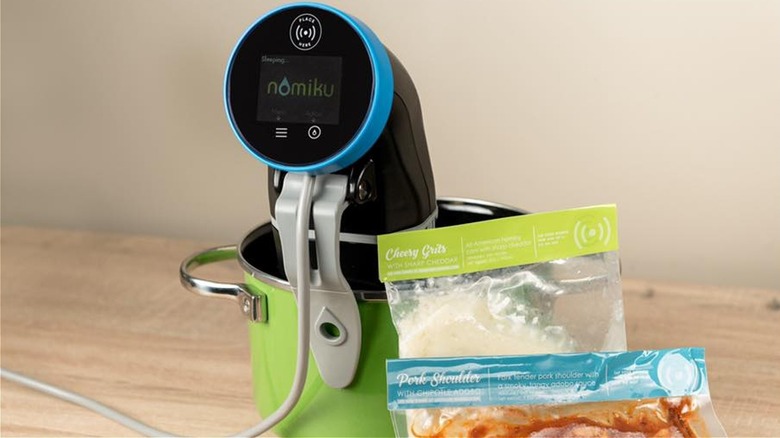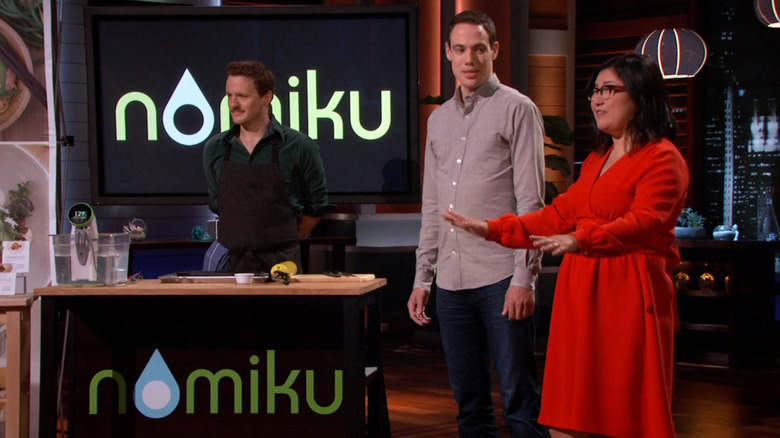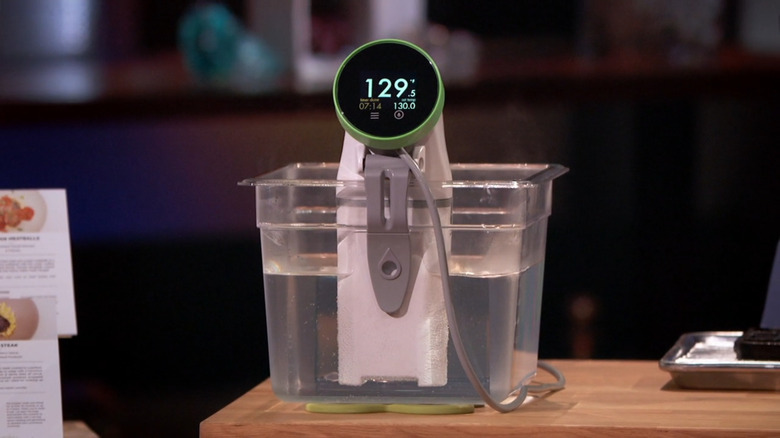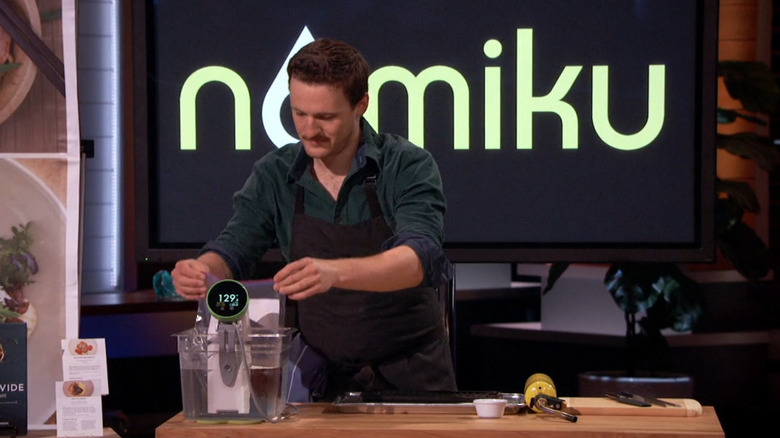Here's What Happened To Nomiku After Shark Tank
There are only so many ways to cook a chicken. Roasting, stir-frying, and slow-cooking immediately spring to mind, but what about sous vide? This is a cooking method that slowly heats vacuum-sealed food in a water bath to a precise temperature, almost like an underwater slow cooker. This allows the chef to leave the food for hours at a time while it cooks.
Items like sous vide pork belly can be found in gourmet restaurants, but despite its fancy name and reputation, the truth about sous vide is that it's a very simple cooking method. What's less accessible is the cost of sous vide machines. That's why Lisa Fetterman resigned herself to saving up thousands for her own at-home sous vide machine — that is until she met her husband, Abe.
On their first date, Lisa shared her love for sous vide and her aspirations to have such a machine in her home. Abe, a trained plasma physicist, said he could make one for her easily. After a trip to the hardware store, they created their own handheld sous vide circulator that could clip onto the side of any pot. After their foodie friends wanted in on the fun, the couple realized they could market this handy new device, titled Nomiku, to home cooks everywhere. After a few initial fundraising rounds and a successful Kickstarter campaign, the Fettermans appeared on "Shark Tank" Season 8, Episode 10.
What happened to Nomiku on Shark Tank
By the time Lisa and Abe Fetterman appeared on "Shark Tank" in 2016, they had made about $3 million in sales since launching the company in 2012. They were seeking $250,000 for a 5% stake in Nomiku. Accompanied on stage by a chef, the entrepreneurs offered the Sharks several dishes including steak, shrimp cocktail, and chocolate coconut custard, all of which had been "Nomiku'd," as Lisa explained. Across the board, the Sharks were impressed by the food's flavor, but that wasn't enough to turn them into investors.
Mark Cuban said he was unfamiliar with the market and the competitor scene. Robert Herjavec asked what the benefit of this cooking method was, to which Lisa replied that it's one-button cooking. Unable to see this as a sufficient reason to invest, both Herjavec and Lori Greiner decided to pull out. Kevin O'Leary was the first Shark to make an offer, stating that he had two major demographics to which his endorsement would immediately appeal. He offered the Fettermans $250,000 for a 10% stake.
Guest Shark Chris Sacca worried that diluting the equity much more would cause the founders to lose their emotional and financial stake in the business, and while hearing Sacca's full offer, O'Leary withdrew his. Finally, Sacca offered the same deal as O'Leary but with the added stipulation that the Fettermans devalue their previous investor's equity stakes. After a brief deliberation, Lisa and Abe accepted the deal.
Nomiku after Shark Tank
With Sacca's investment and support behind it, Nomiku saw tremendous growth after its "Shark Tank" appearance, and many buyers — not just home cooks — began showing interest in the product. Even gourmet chefs reportedly wanted a Nomiku, despite having some of the biggest industrial kitchen budgets imaginable. Notoriously pretentious and now infamous restaurant Noma was just one of Nomiku's customers, among many.
Following this initial success and immediate interest in its original handheld sous vide machine, Nomiku began expanding its product line. Soon, a second version of the original machine was available. This new device could be controlled remotely via Wi-Fi, allowing users to stop and start cooking from anywhere. The initial design retailed for $199, while the Wi-Fi-compatible model was available for $249. Further expanding Nomiku's product line, Lisa wrote two sous vide cookbooks, "Sous Vide At Home" and "Sous Vide Made Simple," and even launched a ready-to-be-sous-vide prepared meal delivery service. Nomiku also developed an app meant to connect sous vide home cooks with even more recipes. With so much momentum, and with everyone from regular home cooks to Michelin-rated chefs endorsing the product, it seemed as though Nomiku was unstoppable. Unfortunately, however, the company is no more.
Why did Nomiku go out of business?
Ultimately, it seems as though poor manufacturing, a flooded market, and customer dissatisfaction all contributed to Nomiku's downfall. While there was plenty of hope for the Wi-Fi-connected, 2.0 version of the product, it was not well-received. In 2016, Ashlee Clark Thompson reviewed the new sous vide circulator for CNET and described it as feeling "like a dinosaur — big, intimidating and in danger of extinction if it doesn't evolve."
This model was much heavier and bulkier than the original but still lacked many features beyond its remote connectivity. While Nomiku had an edge by being at the forefront of a burgeoning market, competitors soon created more affordable handheld sous vide machines that often had more features, such as Bluetooth connectivity. Nomiku eventually launched a final circulator that could automatically program itself to certain temperatures according to an RFID chip, but these weren't available for long before the company went out of business in 2019.
Additionally, comments on the company's Kickstarter revealed that some customers never received their machines, and many who did complained of faulty products that mysteriously stopped working. In an interview with The Spoon, Lisa said, "When I started Nomiku, I always knew the tremendous risk it held to invent a category and then fight against really [cut-throat] competitors." She did state, however, that she was still incredibly proud of how far the brand had come.
What's next for Nomiku's founders?
Lisa fell in love with high-end dining while working in gourmet restaurants, which is what prompted her to create her product. After Nomiku ceased operations in 2019, however, she has taken her interests elsewhere. She now practices psychedelic integration under the title of Reverend. According to her LinkedIn, she is a psychedelic minister who offers "[one-on-one] group coaching on psychedelic integration from an Internal Family Systems, Positive Psychology, and Hakomi informed approach."
While this may seem like a harsh pivot, she remains an entrepreneur and lists herself as the founder of her own counseling practice, as well as the co-founder of a consultation group called Lead Embodied that focuses on psychedelic integration and leadership training. The details of what these organizations do on a practical, day-to-day level remain somewhat vague.
Abe's LinkedIn, meanwhile, reveals that he has dedicated his career to A.I. engineering and coding. In 2019, he began working with an A.I.-based employee recruitment company called Sourceress as a Lead Machine Learning Engineer. After what Abe described as "uncovering an opportunity in machine learning," however, he resigned from the role. He pivoted to the role of Member of Technical Staff for a company called Imbue, which creates A.I. that can allegedly code and is "optimized for reasoning."




